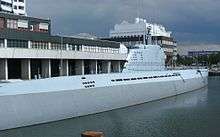German submarine Wilhelm Bauer
 | |
| History | |
|---|---|
| Name: | U-2540 |
| Namesake: | Wilhelm Bauer |
| Ordered: | 6 November 1943 |
| Builder: | Blohm & Voss, Hamburg |
| Yard number: | 2540 |
| Laid down: | 28 October 1944 |
| Launched: | 13 January 1945 |
| Commissioned: | 24 February 1945 (as U-2540) |
| Recommissioned: | 1 September 1960 (as Wilhelm Bauer) |
| Decommissioned: | 28 August 1968 |
| In service: | May 1970 |
| Out of service: | 15 March 1982 |
| Renamed: | Wilhelm Bauer |
| Fate: |
|
| Status: | Museum ship, 27 April 1984 |
| General characteristics | |
| Class & type: | Type XXI submarine |
| Displacement: |
|
| Length: | 76.70 m (251 ft 8 in) (o/a) |
| Beam: | 8 m (26 ft 3 in) |
| Height: | 11.30 m (37 ft 1 in) |
| Draught: | 6.32 m (20 ft 9 in) |
| Propulsion: |
|
| Speed: |
|
| Range: |
|
| Test depth: | 240 m (790 ft) |
| Complement: | 5 officers, 52 enlisted |
| Sensors and processing systems: |
|
| Armament: |
|
Wilhelm Bauer (originally designated U-2540) is a Type XXI U-boat of Nazi Germany's Kriegsmarine, completed shortly before the end of World War II. It was scuttled at the end of the war, having never gone on patrol. In 1957, it was raised from the seabed off Flensburg Firth and recommissioned in the West-German Bundesmarine in 1960. Finally decommissioned in 1980, it is the only floating example of a XXI U-boat.
Construction and wartime service
Construction of U-2540 began on 28/29 October 1944 by Blohm & Voss in the Hamburg-Finkenwerder. She was launched on 13 January 1945 and commissioned on 24 February 1945 as part of 31st U-boat Flotilla for training purposes. In April 1945 the boat went to the front after training at Rønne on Bornholm. Due to the ongoing fuel shortages at the end of the war, the boat was relocated to Swinemünde before being scuttled near the Flensburg lightship on 4 May 1945.
Design
Like all Type XXI U-boats, U-2540 had a displacement of 1,621 tonnes (1,595 long tons) when at the surface and 1,819 tonnes (1,790 long tons) while submerged. She had a total length of 76.70 m (251 ft 8 in), a beam length of 8 m (26 ft 3 in), and a draught length of 6.32 m (20 ft 9 in).[1] The submarine was powered by two MAN SE supercharged six-cylinder M6V40/46KBB diesel engines each providing 4,000 metric horsepower (2,900 kilowatts; 3,900 shaft horsepower), two Siemens-Schuckert GU365/30 double-acting electric motors each providing 5,000 PS (3,700 kW; 4,900 shp), and two Siemens-Schuckert silent running GV232/28 electric motors each providing 226 PS (166 kW; 223 shp).[1]
The submarine had a maximum surface speed of 15.6 knots (28.9 km/h; 18.0 mph) and a submerged speed of 17.2 knots (31.9 km/h; 19.8 mph). When running on silent motors the boat could operate at a speed of 6.1 knots (11.3 km/h; 7.0 mph). When submerged, the boat could operate at 5 knots (9.3 km/h; 5.8 mph) for 340 nautical miles (630 km; 390 mi); when surfaced, she could travel 15,500 nautical miles (28,700 km; 17,800 mi) at 10 knots (19 km/h; 12 mph).[1] U-2540 was fitted with six 53.3 cm (21.0 in) torpedo tubes in the bow and four 2 cm (0.8 in) anti-aircraft guns. She could carry twenty-three torpedoes or seventeen torpedoes and twelve mines. The complement was five officers and fifty-two men.[1]
Salvage, refit, and new service
In June 1957, after more than 12 years on the floor of the Baltic Sea, U-2540 was raised and overhauled at Howaldtswerke, Kiel. The submarine was commissioned as a research vessel in the Bundesmarine, serving from 1 September 1960 until 28 August 1968 as a test boat (class 241). On relaunch she was renamed Wilhelm Bauer, after the designer of the first German U-boat, Brandtaucher, built in Kiel by August Howaldt in 1850. From May 1970 she again entered service, this time with a civilian crew and served as a testbed for the technical innovations of the class 206 U-boat. After an underwater collision with the German destroyer Z-3 (D172) on 6 May 1980 Wilhelm Bauer was discharged from use at Eckernförde on 18 November 1980 and finally released from service on 15 March 1982.
Conversion to museum ship

U-2540 was put on sale by the Ministry of Defence and acquired by the board of trustees of the German Maritime Museum Association and the German Maritime Museum. The boat was restored to its original World War II configuration after its transfer in August 1983 to the Seebeck yard, opening on 27 April 1984 as a museum ship, now sponsored by the Wilhelm Bauer Technology Museum association. It has imitation twin 30mm cannon and the bridge is not glazed as it was during service with the Bundesmarine.
Other surviving U-boats
References
- 1 2 3 4 Gröner 1991, p. 85.
Bibliography
- Busch, Rainer; Röll, Hans-Joachim (1999). Deutsche U-Boot-Verluste von September 1939 bis Mai 1945. Der U-Boot-Krieg (in German) IV (Hamburg, Berlin, Bonn: Mittler). ISBN 3-8132-0514-2.
- Gröner, Erich; Jung, Dieter; Maass, Martin (1991). U-boats and Mine Warfare Vessels. German Warships 1815–1945 2. Translated by Thomas, Keith; Magowan, Rachel (London: Conway Maritime Press). ISBN 0-85177-593-4.
External links
- A tour of the submarine (requires QuickTime VR software) (German)
- U-Boot Type XXI in detail, Essay with numerous photos of the Wilhelm Bauer attached.
- U-2540 gallery at uboat.net
| ||||||||||||||||||||||||||||||
| ||||||||||
Coordinates: 53°32′29″N 8°34′40″E / 53.54139°N 8.57778°E